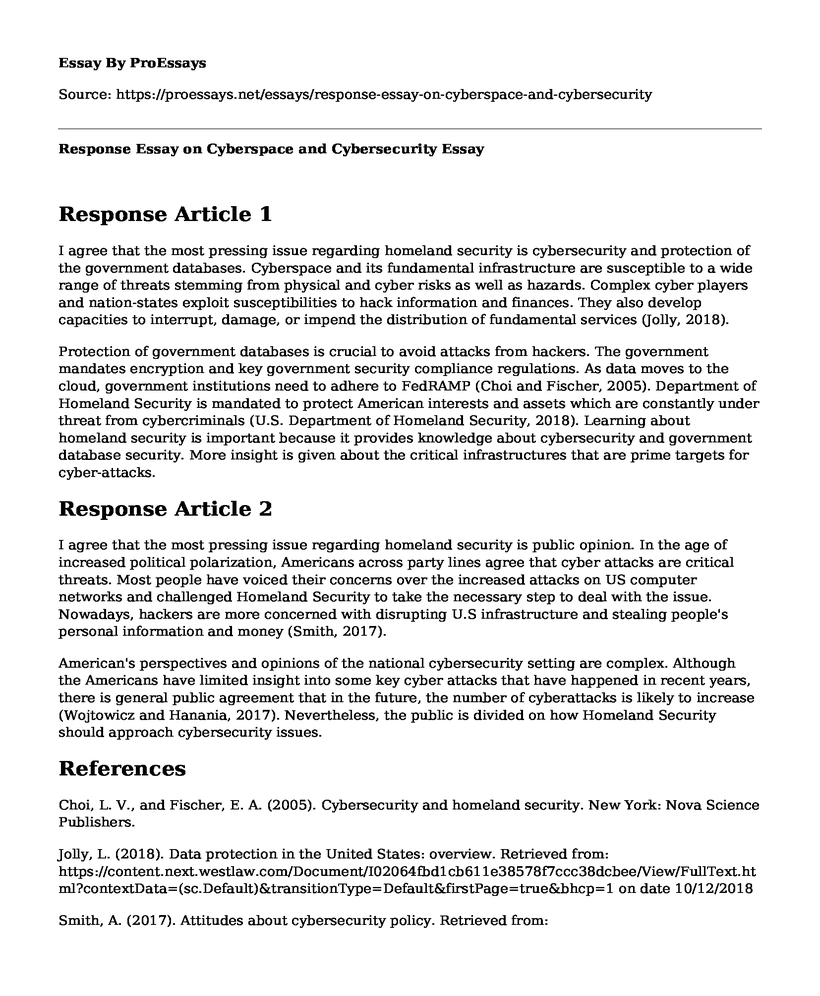Response Article 1
I agree that the most pressing issue regarding homeland security is cybersecurity and protection of the government databases. Cyberspace and its fundamental infrastructure are susceptible to a wide range of threats stemming from physical and cyber risks as well as hazards. Complex cyber players and nation-states exploit susceptibilities to hack information and finances. They also develop capacities to interrupt, damage, or impend the distribution of fundamental services (Jolly, 2018).Protection of government databases is crucial to avoid attacks from hackers. The government mandates encryption and key government security compliance regulations. As data moves to the cloud, government institutions need to adhere to FedRAMP (Choi and Fischer, 2005). Department of Homeland Security is mandated to protect American interests and assets which are constantly under threat from cybercriminals (U.S. Department of Homeland Security, 2018). Learning about homeland security is important because it provides knowledge about cybersecurity and government database security. More insight is given about the critical infrastructures that are prime targets for cyber-attacks.
Response Article 2
I agree that the most pressing issue regarding homeland security is public opinion. In the age of increased political polarization, Americans across party lines agree that cyber attacks are critical threats. Most people have voiced their concerns over the increased attacks on US computer networks and challenged Homeland Security to take the necessary step to deal with the issue. Nowadays, hackers are more concerned with disrupting U.S infrastructure and stealing people's personal information and money (Smith, 2017).
American's perspectives and opinions of the national cybersecurity setting are complex. Although the Americans have limited insight into some key cyber attacks that have happened in recent years, there is general public agreement that in the future, the number of cyberattacks is likely to increase (Wojtowicz and Hanania, 2017). Nevertheless, the public is divided on how Homeland Security should approach cybersecurity issues.
References
Choi, L. V., and Fischer, E. A. (2005). Cybersecurity and homeland security. New York: Nova Science Publishers.
Jolly, L. (2018). Data protection in the United States: overview. Retrieved from: https://content.next.westlaw.com/Document/I02064fbd1cb611e38578f7ccc38dcbee/View/FullText.html?contextData=(sc.Default)&transitionType=Default&firstPage=true&bhcp=1 on date 10/12/2018
Smith, A. (2017). Attitudes about cybersecurity policy. Retrieved from: http://www.pewinternet.org/2017/01/26/3-attitudes-about-cybersecurity-policy/ on date 10/12/2018
U.S. Department of Homeland Security. (2018). Cybersecurity Overview. Retrieved from: https://www.dhs.gov/cisa/cybersecurity-overview on date 10/12/2018
Wojtowicz, L. and Hanania, D. (2017). Cyber attacks As A Leading Threat To The United States. Retrieved from: https://www.thechicagocouncil.org/publication/americans-view-cyberattacks-leading-threat-united-states on date 10/12/2018
Cite this page
Response Essay on Cyberspace and Cybersecurity. (2022, Mar 03). Retrieved from https://proessays.net/essays/response-essay-on-cyberspace-and-cybersecurity
If you are the original author of this essay and no longer wish to have it published on the ProEssays website, please click below to request its removal:
- Discuss Whether and How Digitalization of Collections Affect Museums
- Password Management. Research Antivirus Software. Kali Linux.
- Mirai Botnet: Malware Infecting ARC Processors, Creating Botnets - Essay Sample
- Cyber Security Threat Landscape
- Wireless Local Area Network: Improving the Value of IT in Daily Lives - Essay Example
- Free Essay Sample on Technology Into Our Daily Lives
- Comparison and Contrast of Museum Websites - Essay Sample







